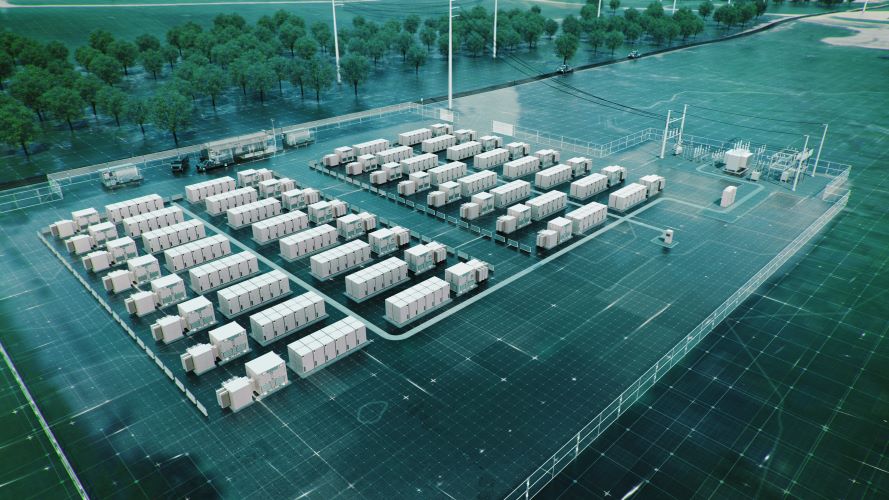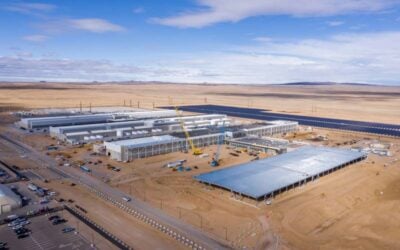
US utility Alliant Energy’s plans to build two large-scale battery storage projects to pair with solar PV plants in Wisconsin have been approved by regulators.
The company said yesterday (9 August) that the Public Service Commission Wisconsin (PSCW) has given the green light to its proposals for Alliant Energy’s Grant County Battery Project and Wood County Battery Project.
Enjoy 12 months of exclusive analysis
- Regular insight and analysis of the industry’s biggest developments
- In-depth interviews with the industry’s leading figures
- Annual digital subscription to the PV Tech Power journal
- Discounts on Solar Media’s portfolio of events, in-person and virtual
Each will be integrated with a large-scale solar PV plant also bearing the name of their respective host counties.
The Grant County battery energy storage system (BESS) will be 100MW output, integrated with the 200MW Grant County Solar Project. The PV plant is currently under construction in the Grant County town of Potosi, and is expected to go into commercial operation in H1 2024.
Meanwhile Wood County’s BESS will be 75MW, integrated with the 150MW Wood County Solar Project that already went into operation in late 2022, in the town of Saratoga.
As reported by Energy-Storage.news in October 2022 when Alliant Energy revealed it was seeking the PSCW’s approvals, both BESS assets will be 4-hour duration, making Grant County 100MW/400MWh and Wood County 75MW/300MWh for a total of 175MW/700MWh.
Also reported at the time was that energy storage system integrator FlexGen was selected by the utility to work on the projects. Alliant confirmed yesterday that this is the case, with FlexGen to provide both energy management system (EMS), based on the company’s HybridOS operating platform, as well as battery storage hardware.
Alliant, which supplies both electricity and natural gas to retail customers, is targeting carbon neutrality across its electricity business by 2050. This commitment is part of the company’s ‘Clean Energy Vision’ which pledges to reduce greenhouse gas (GHG) emissions 50% relative to 2005 levels by 2030, and eliminate coal from its generation fleet by 2040.
Within that, the company has separate roadmaps – called Clean Energy Blueprints – for its activities in the two states in which it operates, Wisconsin and Iowa. In Wisconsin, that includes plans to build 1,100MW of new solar PV generation by 2024 across a total of 12 large-scale projects, on which it began development in 2020.
In Wisconsin as a whole, coal still accounts for the largest share of generation, although at least half of its coal fleet – running on fuel mostly brought in by train from Wyoming – of 5,300MW is scheduled for retirement by the end of 2024. Around 42% of net electricity generation in the state in 2021 came from coal, but this marked the continuation of a decline which meant coal fell below half of the generation mix for the first time in 2019, according to the US Energy Information Administration (EIA).
Meanwhile, the state’s largest share of renewable generation comes from biofuels. Other renewables resources including solar, wind and hydroelectric only accounting for about 10% of total generation, and solar only for about 10% of that. Other major sources of electric power include natural gas and nuclear.
Although the state is at an early stage in its adoption of solar – the first large-scale solar PV plants in Wisconsin were completed in 2020 – and at an even earlier stage in embracing energy storage, Energy-Storage.news has reported on a handful of large developments in the past couple of years.
February 2021: Utility holding company WEC Energy Group filed for approval of the state’s first solar-plus-storage project, Paris Solar-Battery Park in Kenosha County. PSCW approval was granted just over a year later for the 310MW PV plant, paired with 110MW of battery storage.
March 2021: The two WEC group subsidiaries behind that project submitted plans to buy electricity from another just a month later, Darrien Solar Energy Center, which would comprise 250MW of solar generation and 75MW of battery storage.
As with the Paris project, another utility, Madison Gas & Electric, would sign a power purchase agreement (PPA) for a smaller share of the output. Approval was granted for the utilities to buy power from the plant in late 2022.
April 2022: The PSCW approved Koshkonong Solar Energy Center, a project pairing 300MW of PV with a 165MW BESS, proposed by Invenergy, which is also the developer on the Paris project.
February 2023: Alliant Energy proposed a 99MW/396MWh BESS asset to be constructed at one of the utility’s coal plants which is scheduled for retirement in 2025.
March 2023: WEC’s subsidiaries WE Energies and WPS said they would once again partner with Madison Gas & Electric (MG&E), this time to buy output from Invenergy’s Koshkonong project.






